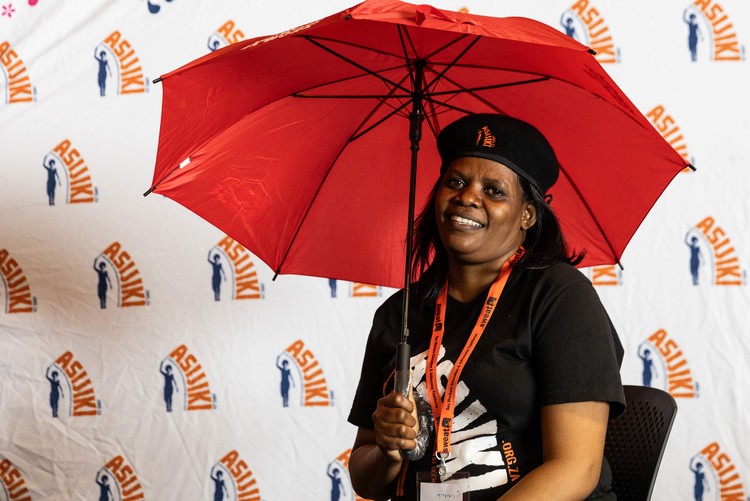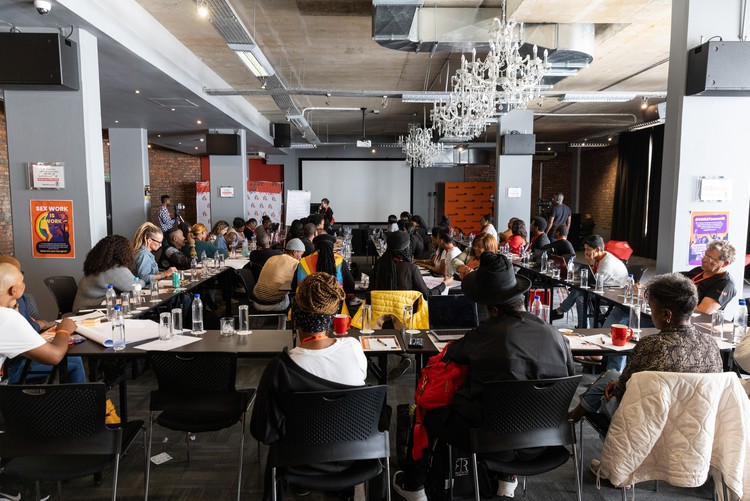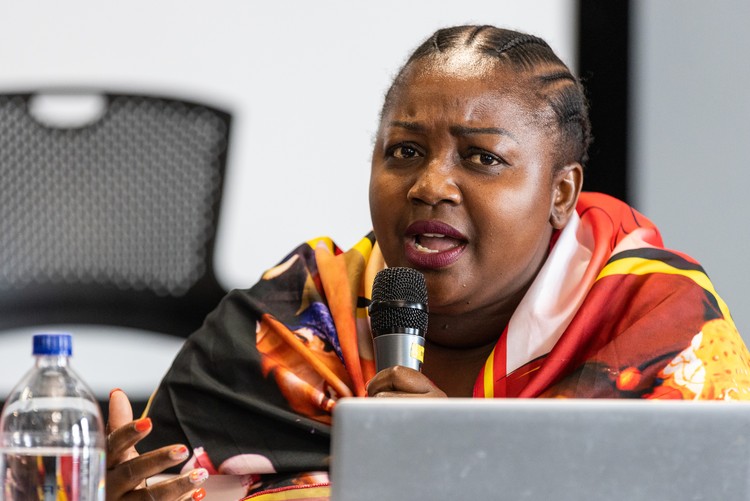Sex workers gather in Cape Town to push for decriminalisation
COSATU calls for sex workers to unionise
Constance Mathe, a sex worker and national coordinator of the Asijiki Coalition said that the decriminalisation bill was taking too long to be approved and that sex sex workers are being “slaughtered like chickens”. Photos: Ashraf Hendricks
- SWEAT has held its first sex workers decriminalisation summit.
- The two day meeting brought together sex workers, their allies, labour and government.
- Sex worker activists plan to resubmit the sex work decriminalisation bill by March 2024.
Sex work in South Africa was on the verge of being decriminalised, but earlier this year a draft bill that was set for Parliament to vote on, was delayed.
It’s against this background that a summit on decriminalisation is taking place in Cape Town. Organised by SWEAT, a sex worker advocacy organisation, the two day gathering brings together sex workers, their allies, trade unions and government officials to discuss the way forward. The event attended by about 50 people at the Protea Fire and Ice hotel near the city centre also focuses on getting youth involved with sex worker advocacy.
Constance Mathe is a sex worker and national coordinator of the Asijiki Coalition. Mathe said they have been fighting for decriminalisation for over 20 years. She said the draft for the bill started eight years ago, with the final submission being handed over to the Department of Justice in March 2022.
Then in May the Department of Justice delayed the bill. At the time, Deputy Minister of Justice John Jeffery, during the budget debate on 30 May, said the bill “may not pass constitutional muster if it does not also provide for the regulation of sex work”.
Mathe said sex workers are “slaughtered like chickens”, which is something decriminalisation can change. She lamented the bill’s delay, saying sex work is seen as a moral issue when in fact “it’s a human rights issue”.
They are aiming to get a new bill submitted to Parliament by March 2024, before the elections.
The bill, if passed, will achieve three things: (1) The removal of criminal charges against sex workers. (2) That the buying and selling of sex will no longer be illegal. (3) All laws that criminalise sex work will be repealed.
Chrispin Phiri, spokesperson for the justice department, confirmed the bill is being revised. “The Department is committed to prioritising the decriminalisation of sex work to safeguard the human rights of sex workers and is actively working to ensure that the Bill is processed as efficiently as possible,” he said.
The meeting is taking place the Protea Fire and Ice hotel in Cape Town.
COSATU urges sex workers to unionise
Jamela Mhlarhi, national chairperson of the COSATU Young Workers, attended the meeting. She said COSATU supports the decriminalisation bill. The organisation has also tabled resolutions on sex work with the Department of Labour.
Mhlarhi urged sex workers to unionise. “We are against any form of discrimination in terms of any work,” she said.
Mhlarhi says her organisation has been working with Sisonke, a movement of sex workers, for a long time and has assisted them to mobilise workers under the COSATU umbrella.
“We want all sex workers to be united,” she said. “If you aren’t organised you are vulnerable”.
Campaigns to support sex workers
The conference has several sessions addressing sex worker concerns.
On Tuesday morning, a panel discussed decriminalisation and youth activism. Because of criminalisation, “some people believe whenever they associate with sex workers they are associating with criminals,” said Nokwanda Gambushe of Sisonke.
Pam Ntshekula of SWEAT described using social media platforms such as instagram and Tiktok to advocate for sex workers’ rights. She says they are using these to show young people that sex workers are normal people.
Liyema Somnono, a paralegal, talked about the need for HIV prevention services for sex workers. Somnono said the nature of sex work makes people vulnerable to HIV and structural barriers preventing people from accessing health services need to be addressed.
“It’s not that sex workers don’t know what is available to us, but because we are stigmatised when we try to access these services, we stop going,” she said.
An online session was also held with sex work activists from Kenya, Brazil, and New Zealand. Josephine Achieng, Deputy Director of Bar Hostess Empowerment and Support for Sex Workers (BHESP) in Kenya, said sex work would be much safer if it wasn’t illegal. “Criminalisation does not stop sex work … it does not stop me from going to the streets,” she said. She congratulated South Africa on the progress made. Sex work is criminalised in Kenya.
“We are against any form of discrimination in terms of any work”, said Jamela Mhlarhi, National Chairperson of the COSATU Young Workers at a two-day summit on sex work. Mhlarhi said COSATU supports the sex work decriminalisation bill.
Support independent journalism
Donate using Payfast

Don't miss out on the latest news
We respect your privacy, and promise we won't spam you.
© 2023 GroundUp. This article is licensed under a Creative Commons Attribution-NoDerivatives 4.0 International License.
You may republish this article, so long as you credit the authors and GroundUp, and do not change the text. Please include a link back to the original article.
We put an invisible pixel in the article so that we can count traffic to republishers. All analytics tools are solely on our servers. We do not give our logs to any third party. Logs are deleted after two weeks. We do not use any IP address identifying information except to count regional traffic. We are solely interested in counting hits, not tracking users. If you republish, please do not delete the invisible pixel.



